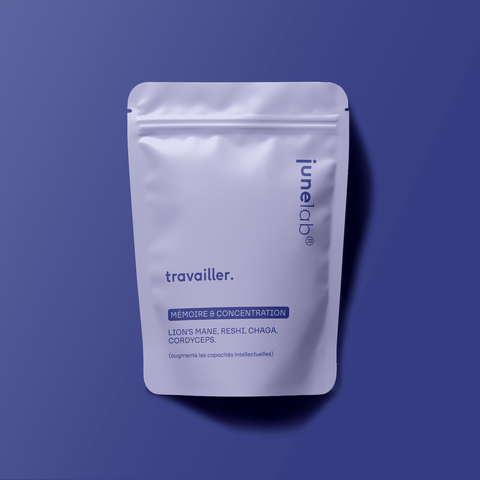Introduction: Understanding Memory, an Essential Asset in Our Daily Life
Memory is one of our brain's most valuable cognitive functions. It allows us to store, retrieve, and use the information we need to complete daily tasks, solve problems, and interact with the world around us. However, memory is not a simple process; it is divided into several types, the best known of which are short-term memory and long-term memory .
In this article, we'll explore the differences between short-term and long-term memory, their respective roles, and how we can boost them to get the most out of them. In addition to common strategies, we'll look at how natural solutions, such as adaptogenic mushrooms, can help improve these types of memory. June Laboratoire's Focus and Memory Formula , which contains a blend of adaptogenic mushrooms such as Lion's Mane, Reishi, Chaga, and Cordyceps, is a great option for those looking to boost their memory naturally.
1. What is Short Term Memory?
Short-term memory is the brain's temporary storage system. It is often compared to a mental notepad where we store the information we need for a few seconds or minutes. For example, remembering a phone number just long enough to dial it or recalling an address while walking are typical short-term memory tasks. This memory is essential for processing immediate information and making quick decisions.
However, short-term memory is limited in capacity and duration. It can typically only hold about 7 items at a time, and the information it contains is quickly erased if it isn't transferred to long-term memory. Stress and lack of sleep can disrupt this memory and reduce our ability to process temporary information.
Adaptogenic mushrooms, like those found in June Laboratoire's Focus and Memory Formula , can play an important role in supporting short-term memory. By helping to reduce stress and promote better concentration, these mushrooms enable the brain to better retain information in the short term, thus improving our daily mental efficiency.

2. Long-Term Memory: A Sustainable Information Bank
Unlike short-term memory, long-term memory stores information for an extended period of time, ranging from several days to years, or even a lifetime. It is essential for recalling facts, events, skills, or knowledge. Long-term memory is divided into several subcategories, including episodic memory (which stores personal memories), semantic memory (which contains facts and general knowledge), and procedural memory (which retains skills and habits).
The consolidation of information from short-term memory to long-term memory depends on many factors, including the emotional significance of the information, rehearsal, and sleep quality. Unfortunately, with aging, long-term memory functions can deteriorate, leading to forgetfulness or difficulty recalling old memories.
Adaptogenic mushrooms , such as Lion's Mane, included in June Laboratoire's Focus and Memory Formula , are known to promote neuronal regeneration, which helps strengthen long-term memory. By stimulating connections between brain cells, these mushrooms contribute to better retention of memories and knowledge.

3. How Memory Processes Work: From Encoding to Retrieval
Memory works through three main processes: encoding, storage, and retrieval. Encoding is the initial process by which we transform sensory information into a format the brain can process. This step is essential for the brain to store information. Short-term memory is heavily involved in encoding because it acts as a filter that determines what information is important enough to remember.
Storage is the phase where information is stored in long-term memory. Finally, retrieval is the process by which we access stored information when we need it. This stage depends primarily on long-term memory.
Adaptogenic mushrooms can play a role in each of these processes. Reishi, for example, helps calm the mind, which improves information encoding by reducing mental distractions. Lion's Mane promotes neuronal regeneration, supporting information storage, while Cordyceps improves blood circulation in the brain, facilitating memory retrieval.
4. Factors That Impact Short-Term Memory and Long-Term Memory
Several factors influence the performance of our short-term and long-term memory. Here are the main ones:
-
Stress : Chronic stress is one of the enemies of memory. It increases levels of cortisol, a hormone that weakens neural connections and impairs memory function. By using adaptogenic mushrooms like those in June Laboratoire's Concentration and Memory Formula , you can help your body better manage stress and thus protect your memory.
-
Sleep : Memory consolidation occurs primarily during sleep, when the brain organizes and stores information from the day. A lack of sleep can therefore affect both short-term and long-term memory.
-
Diet : A diet rich in antioxidants, omega-3s, and B vitamins is essential for healthy brain function. Nutrient-rich adaptogenic mushrooms can also be added to improve overall cognitive health.

5. Exercises and Practices to Stimulate Short-Term and Long-Term Memory
In addition to natural solutions, certain practices and exercises can help strengthen your memory. Here are some suggestions:
-
Repetition : Repeating information helps strengthen neural connections in the brain, making it easier to move information from short-term to long-term memory.
-
Memory games : Puzzles, logic games, and crosswords stimulate short-term memory and improve concentration. These games are a great way to exercise your brain.
-
Visualization : Creating mental images helps you retain information better. This technique is particularly useful for long-term memory.
6. The Benefits of Adaptogenic Mushrooms for Memory
Adaptogenic mushrooms are powerful allies in supporting memory and focus. Here's how each mushroom in June Laboratoire's Focus and Memory Formula helps strengthen memory:
-
Lion's Mane : Promotes neuronal regeneration and strengthens long-term memory by enhancing nerve cell growth.
-
Reishi : Reduces stress and promotes a calm mind, facilitating the encoding of information and improving short-term memory.
-
Chaga : Rich in antioxidants, it protects brain cells against oxidative stress and promotes better memory retention.
-
Cordyceps : Improves blood circulation in the brain, increasing mental energy and facilitating memory retrieval.
By regularly using June Laboratoire's Concentration and Memory Formula , you can optimize your memory and boost both information storage and retrieval capabilities.
Conclusion: Optimize Your Memory in a Natural and Sustainable Way
Short-term and long-term memory each play a crucial role in our daily lives. Understanding their differences and knowing how to strengthen them is essential for maintaining optimal cognitive performance. By incorporating specific exercises, adopting a healthy lifestyle, and using natural supplements, you can significantly improve your memory.
Adaptogenic mushrooms, like those in June Laboratoire's Focus and Memory Formula , are a natural and effective way to boost memory skills, providing comprehensive support for the various stages of the memory process. Whether you're looking to improve your focus, better retain information, or recall precious memories, this formula can help you get the most out of your cognitive abilities.
For more information on the memory benefits of adaptogenic mushrooms, check out our main article, which explores the benefits of these mushrooms for boosting cognitive health in a sustainable and natural way.












